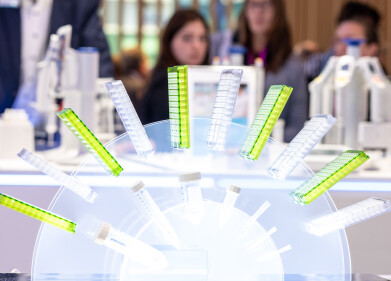Laboratory news
4 Types of Artificial Intelligence
Dec 14 2021
Artificial intelligence (AI) is continually evolving, with new technologies always pushing the limits of what’s possible. Despite the astonishing progress that’s been made over the past few decades, all AI can be grouped into the following four categories explored below:
Reactive Machines AI
Reactive Machines are the original form of AI and replicate the ability of humans to respond to different stimuli. Capabilities are limited as the machines aren’t equipped with memory-based intelligence and can’t use past experiences to “learn” and make smarter decisions.
AlphaGo, an advanced computer program developed by Google subsidiary DeepMind Technologies, is an example of Reactive Machine AI. In a 2016 showdown, the program beat international Go champion Lee Se-dol four times and was defeated just once. Deep Blue, a chess-playing supercomputer engineered by IBM is another iconic example of Reactive Machine AI.
Limited Memory AI
As well as responding to stimuli, Limited Memory machines can actively learn from past experiences and historical data. Machines are programmed using training data, which is then stored and used at will to solve problems and make decisions. Face recognition technologies are powered by Limited Memory AI, as well as virtual assistants and chatbots. Self-driving vehicles that use sensors to detect traffic signals, pedestrians, road grades and other variables to make informed decisions are also examples of Limited Memory machines.
Theory of Mind AI
Theory of Mind AI is in its early stages and aims to understand human needs by detecting emotions, discerning beliefs and mapping thought processes. It builds on the concept of artificial emotional intelligence and takes a very “human” approach to AI.
Self-aware AI
While it currently exists as a hypothetical concept, Self-aware AI could have incredible implications. The goal is to engineer machines that are so highly developed and skilled at imitating the human brain that they develop self-awareness. As well as understanding the needs and emotions of the entities it interacts with, Self-aware AI will nurture needs and emotions of its own.
Some critics warn Self-aware AI could be dangerous as it empowers machines with the ability to strategise and make decisions based on self-preservation. Ultimately, this could pose a risk to humanity.
The future of AI
Eagle Genomics, a British-based company driving network science innovations in the biology and life sciences sectors, is pushing the limits of artificial intelligence and data-derived assets. Find out more about the company’s exciting new partnership with life science research institute, the Earlham Institute in ‘AI-augmented Discovery Platform to progress Microbiome Multiomics’
For more information on the latest AI advances, including how new technologies are powering the renewable energy revolution, don't miss 'Laboratory AI - How Does It Help Scientific Research?'
Digital Edition
Lab Asia Dec 2025
December 2025
Chromatography Articles- Cutting-edge sample preparation tools help laboratories to stay ahead of the curveMass Spectrometry & Spectroscopy Articles- Unlocking the complexity of metabolomics: Pushi...
View all digital editions
Events
Jan 21 2026 Tokyo, Japan
Jan 28 2026 Tokyo, Japan
Jan 29 2026 New Delhi, India
Feb 07 2026 Boston, MA, USA
Asia Pharma Expo/Asia Lab Expo
Feb 12 2026 Dhaka, Bangladesh



















